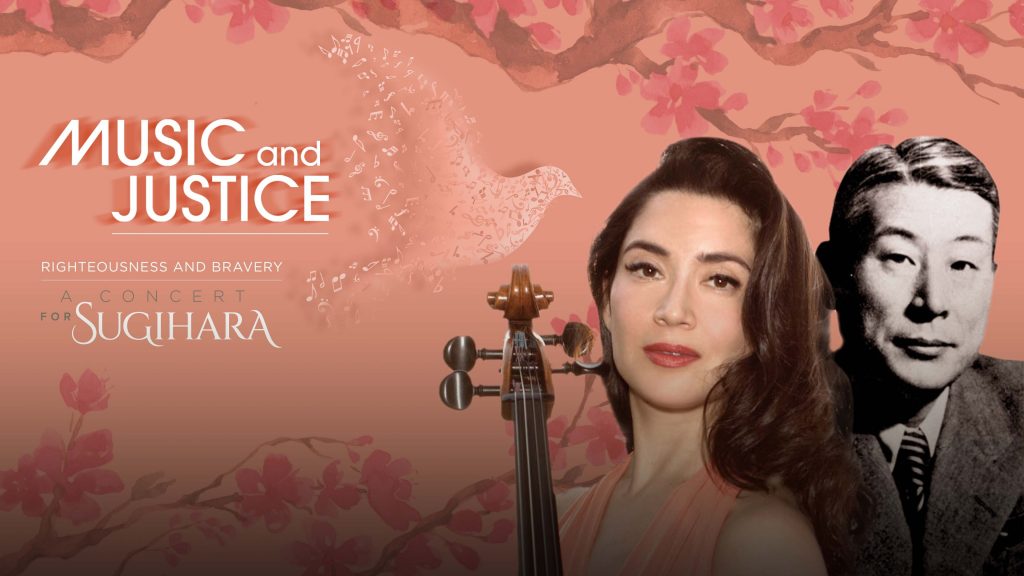The Lowell Milken Center for Music of American Jewish Experience at The UCLA Herb Alpert School of Music is proud to present the west coast premiere of a new musical performance entitled Symphony No. 6,“Vessels of Light” by Lera Auerbach at Royce Hall on May 18 at 8:00 p.m. Yad Vashem, the World Holocaust Remembrance Center in Jerusalem, and The American Society for Yad Vashem commissioned the piece, which was inspired by the heroic actions of Japanese Vice-Consul Chiune Sempo Sugihara, who saved thousands of Jewish refugees during the Holocaust.
Chiune Sempo Sugihara, who issued visas alongside the Honorary Dutch Consul Jan Zwartendijk, risked his life and career by issuing visas, in direct defiance of Japanese government policy, to several thousand Jews who sought to flee Europe. The recipients of Sugihara’s visas were able to escape the tragic fate of millions of Jews in Europe. On October 4, 1984, Yad Vashem recognized Chiune Sempo Sugihara as Righteous Among the Nations, a title awarded on behalf of the State of Israel and the Jewish people for his selfless and courageous wartime actions.
Inspired by the heroism of Chiune Sugihara and the thousands of Jewish lives saved through his decisions and actions during WWII, Lera Auerbach created the music, libretto, and artistic concept for Symphony No. 6, “Vessels of Light,” for Violoncello, Choir, and Orchestra. Auerbach weaves a multilayered tapestry of words and music with Yiddish poetry, the art of Japanese Kintsugi, the mystical Shevirat ha-kelim (“breaking of the vessels”), and the silent words of biblical Psalm 121 in a work she dedicates to Chiune Sugihara and all those who risk everything to save others.
The commission was catalyzed by the world-premiere performer in the symphony, Japanese-American violoncellist Kristina Reiko Cooper, whose husband’s father, Irving Rosen, was rescued thanks to the life-saving visas granted by Chiune Sugihara.
“Chiune Sugihara’s story deeply touched me, and I felt utterly compelled to help bring this incredible story forward,” said Cooper. I could not stop thinking about how my husband and children are alive because of this man’s bravery. He wasn’t some outsized hero. He was a very humble man. He never sought recognition for his acts.”
The concert marks the second of two events in the Lowell Milken Center for Music of American Jewish Experience’s “Music and Justice Series.” The series is devoted to examining race and social justice in the modern world.
“We are thrilled to be partnering with Yad Vashem, the World Holocaust Memorial Center,” said Mark Kligman, director of the Lowell Milken Center for Music of American Jewish Experience. “Our center has global scope, and this concert is a tremendous opportunity to tell stories that remind us all how the acts of courageous individuals can have a ripple effect around the world.”
Lera Auerbach is one of the most exciting contemporary composers working today. “Auerbach delivers lots of fire and passion in music,” writes Anne Midgette of the Washington Post. “She offers 18th-century forms and a 19th-century sensibility (that of the brilliant virtuoso) expressed in a 21st-century vocabulary.” New Yorker music critic Alex Ross has praised her works “of extraordinary power and intensity.”
In describing the symphony, Auerbach wrote, “How do you capture grief? How to make that which is impossible to grasp—graspable?”
“The poems selected for the libretto are vessels containing memories, some so painful as if every letter was a shard. Incantations of memory—letters to nowhere or forevermore—addressed to us, the living. Each shard is a mirror—we are reflected in them.”
“Auerbach’s Symphony No. 6 is a searingly expressive work,” said Neal Stulberg, director of orchestral studies and conducting at The UCLA Herb Alpert School of Music.
For the first part of the concert program on May 18, Stulberg selected Schubert’s Unfinished Symphony. “It’s a work that is contemplative, serious, and evocative of the concert’s theme, but that also speaks personally to each listener. It will be up to everyone on their own to draw connections between these works of music, and between the music and the world,” Stulberg said.
“Righteousness and Bravery: A Concert for Sugihara” follows a series of events in February that launched the Music and Justice series. More than 2,000 attendees witnessed a rich concert program performed both at Royce Hall and Holman United Methodist Church, pairing contemporary pieces with Dave Brubeck’s epic cantata The Gates of Justice. For the first time, Brubeck’s sons Darius, Chris, and Dan performed as the jazz trio in their father’s piece. Brubeck composed Gates in 1969 in an effort to unify Blacks and Jews after the assassination of Martin Luther King Jr. It was commissioned by the umbrella organization of America’s Reform Judaism movement specifically to address increasing tensions between the Jewish and African American communities.
While distinct in story and style, both the February and May concerts uniquely emphasize why The Lowell Milken Center for Music of American Jewish Experience created the Music and Justice series.
“We hope to inspire humanity by creating awareness about how much of a difference music can make, and how even one person can impact the world through justice,” said Kligman.
